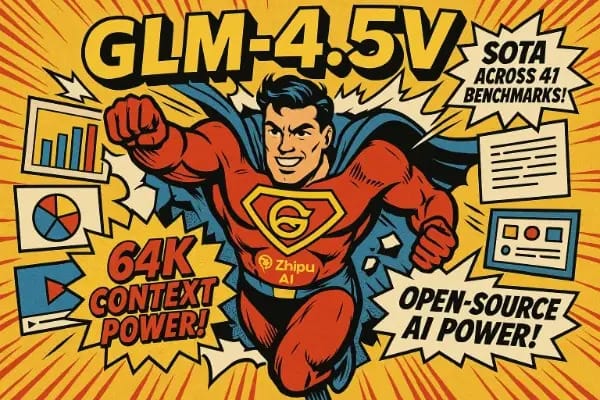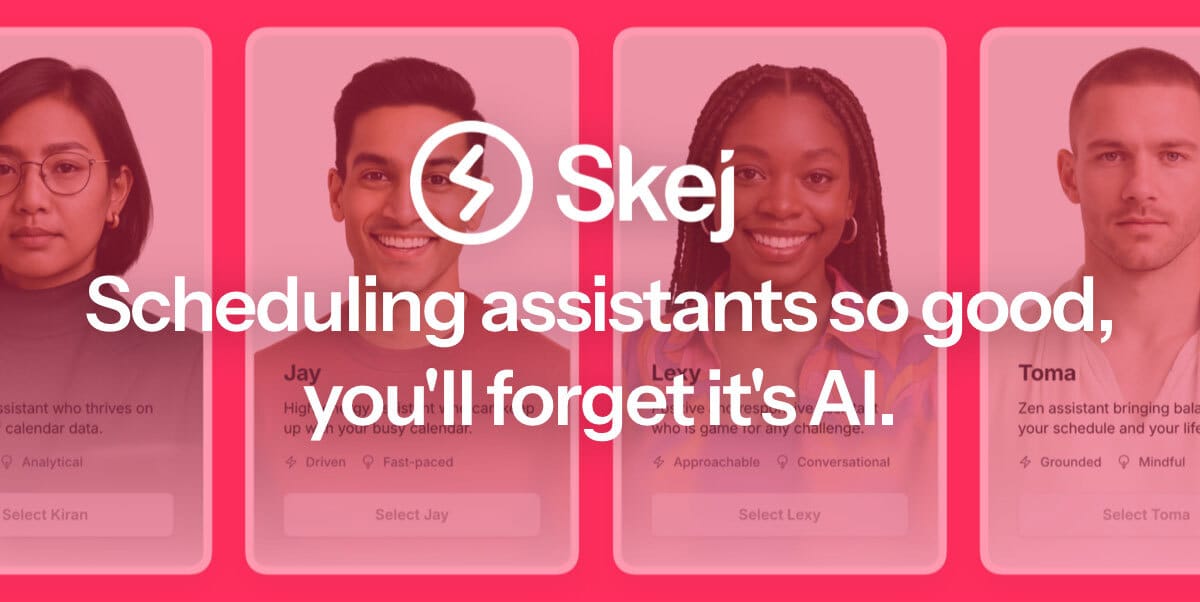- Tech Momentum
- Posts
- Smarter. Bigger. Closer.
Smarter. Bigger. Closer.
Anthropic’s Claude hits 1M tokens, Zhipu unleashes multimodal GLM-4.5V, and AI companion apps boom to $120M revenue in 2025.

Welcome to Tech Momentum!
Claude just hit a million-token stride, Zhipu dropped an open-source multimodal juggernaut, and AI companions are cashing in big. These aren’t just updates—they’re seismic shifts in how we build, think, and connect with machines.
Let’s break it all down!
Updates and Insights for Today
Context Explosion! Claude Sonnet 4 Levels Up!
GLM-4.5V Unleashed: Zhipu's Multimodal Beast Dominates
AI Buddy Boom: $120M in 2025 – Apps That Feel Human!
The latest in AI tech
AI Tutorials: How Claude Code Ranked Me FIRST on Google.
AI tools to checkout
AI News
Context Explosion! Claude Sonnet 4 Levels Up with 1 Million-Token Window!
Quick Summary:
Anthropic launches a 1‑million‑token context window for its Claude Sonnet 4 model, quintuple its previous limit. This upgrade empowers the AI to digest entire codebases (over 75K lines) or multiple long research papers in one shot. It’s now in public beta on Anthropic’s API and Amazon Bedrock, with Google Cloud Vertex AI support coming soon.
Key Insights:
Massive context boost: Claude Sonnet 4 now handles up to 1 million tokens—around five times more than before.
Real‑world scale: Capable of processing huge inputs like “entire codebases” or “dozens of research papers” in one request.
Rolling out gradually: Available in public beta to Tier 4 users via Anthropic API and Amazon Bedrock; Vertex AI support is on the way.
Competitive push: This upgrade helps Anthropic catch up in the long‑context arms race with other AI giants.
Why It’s Relevant:
This breakthrough significantly reduces the need to break down large tasks into smaller chunks, boosting efficiency for developers and analysts. Handling massive contexts in one go allows for deeper, more coherent analysis in coding, research, and legal domains. Plus, this leap puts pressure on competitors to match or exceed context window sizes—accelerating the pace of innovation.
Bonus: Gemini & GPT-5 – How They Stack Up on Context Size
Model | Max Context Window |
|---|---|
Claude Sonnet 4 | 1 million tokens (new) |
Gemini 1.5 Pro | Up to 2 million tokens (select developers) |
GPT-5 (OpenAI) | ~256K tokens (ChatGPT interface); API ~400K total tokens |
Gemini 1.5 Pro even offers up to 2 million tokens, though access is limited and still being optimized.
GPT‑5 provides a strong increase over earlier models with ~256K tokens in the ChatGPT experience, and up to ~400K in the API—but still far below Claude’s and Gemini’s frontier sizes
📌 Read More: Anthropic
Our Partner Today
Modernize your marketing with AdQuick
AdQuick unlocks the benefits of Out Of Home (OOH) advertising in a way no one else has. Approaching the problem with eyes to performance, created for marketers with the engineering excellence you’ve come to expect for the internet.
Marketers agree OOH is one of the best ways for building brand awareness, reaching new customers, and reinforcing your brand message. It’s just been difficult to scale. But with AdQuick, you can easily plan, deploy and measure campaigns just as easily as digital ads, making them a no-brainer to add to your team’s toolbox.
GLM-4.5V Unleashed: Zhipu's Multimodal Beast Dominates
Quick Summary
Zhipu AI has just open‑sourced GLM‑4.5V, a cutting‑edge multimodal (vision‑language) model with top‑tier performance across 41 tasks. It handles images, video, GUI tasks, charts, and long documents, and supports up to 64K multimodal context—equipping developers for powerful real‑world applications.
Key Insights
Open‑source powerhouse: GLM‑4.5V is built on GLM‑4.5‑Air (106B parameters, 12B active), delivered for free to the community.
Top-of‑the‑line benchmarks: Achieves SOTA on 41 public vision‑language benchmarks at the 100B‑parameter level.
Versatile visual reasoning: Excels in image reasoning, video understanding, GUI automation, chart/document parsing, and spatial grounding.
Thinking Mode toggle: Offers a switch between deep, chain‑of‑thought reasoning and fast responses.
Actionable toolset: Comes with an open‑source desktop assistant app that captures screenshots/video and builds agents for real‑world tasks like code generation and interface control.
Why It’s Relevant
GLM‑4.5V brings vision‑native intelligence within reach for developers—without black‑box barriers. Its multimodal reasoning, long‑context grasp, and agentic capabilities make it a formidable open‑source alternative to proprietary systems. With benchmarks, code, and tooling matter‑of‑factly available, this model pushes the pace of innovation in AI accessibility and real‑world diversity.
📌 Read More: HuggingFace, Zai, GitHub
AI Buddy Boom: $120M in 2025 – Apps That Feel Human!
Quick Summary
AI companion apps—those you can virtually befriend, flirt with, or confide in—are exploding. In the first half of 2025, they generated $82 million, and they're racing toward a projected $120 million by December. Downloads and spending per user are both skyrocketing.
Key Insights
Revenue surge: $82 million in H1 2025, on track to exceed $120 million by year-end.
App explosion: Of 337 live, revenue‑generating AI companion apps worldwide, 128 launched this year alone.
Download boom: 60 million downloads in H1—an 88 % increase year-over-year—totaling 220 million global downloads by July.
Higher monetization: Revenue per download jumped from $0.52 (2024) to $1.18 in 2025.
Concentrated success: The top 10 % of these apps pull in 89 % of all revenue; only 33 apps have crossed $1 million in lifetime spending.
Examples & players: Replika, CharacterAI, PolyBuzz, and Chai remain dominant. Big names like xAI (Grok) are entering the field, recognizing its emotional engagement potential.
User behavior: Many of the apps lean into romantic language—17 % include “girlfriend” in their name, versus only 4 % with “boyfriend” or “fantasy.”
Why It’s Relevant
This isn't just tech for tasks—it’s emotional tech. Users are shelling out for AI characters that simulate companionship, romance, and personality. Developers and investors are noticing the shift: creating emotionally resonant AI can be highly profitable. As giants like xAI and Google get involved, the market might evolve into something both lucrative and socially impactful.
📌 Read More: TechCrunch
AI Tutorials
How Claude Code Ranked Me FIRST on Google

Quick Summary
This video features “The Boring Marketer” sharing how he used Claude Code to build, optimize, and rank a local trucking repair website in under 24 hours—landing top Google spots and generating thousands in revenue immediately. It’s a full step-by-step playbook for applying AI to overlooked, “boring” local markets.
Key Insights
Most AI builders focus on SaaS, agents, and flashy products—ignoring profitable local businesses.
Claude Code built and SEO-optimized a 50+ page site in 4 hours, matching Figma designs via Anima plugin.
Local SEO wins fast when competitors have outdated, slow sites.
Keyword research, intent mapping, technical fixes, and rich location pages drive top rankings.
What Can I Learn?
How to identify high-intent local keywords and map them to services/locations.
How to have Claude Code perform full technical SEO audits and fixes.
How to integrate AI-generated content with custom Figma designs via Anima.
How to use sub-agents to multitask SEO, competitor analysis, and content creation.
Which Benefits Do I Get?
Rapid, low-cost market entry in defensible, offline-service niches.
Immediate revenue from high-ranking, high-intent keyword targeting.
Competitive edge against slow, outdated websites.
A repeatable AI-driven workflow adaptable to many “boring” industries.
Why It Matters:
While most AI hype centers on flashy products, the biggest near-term profit opportunities may lie in local, service-based “boring” businesses. They face little sophisticated competition and rely on search for customer acquisition. Using AI to automate website creation, SEO, and optimization allows entrepreneurs to dominate these markets quickly—generating cash flow and building assets resistant to short-term AI disruption.
Here is the full Video Tutorial 👉 Click Here
The latest in AI tech

1. Nvidia Unveils Cosmos Models
Nvidia introduces Cosmos Reason and Cosmos Transfer-2, boosting AI’s ability to understand physical environments and generate synthetic training data faster. This leap empowers robotics, autonomous systems, and simulation-heavy industries to build smarter, safer AI agents with advanced planning capabilities.
📌 Read More: TechCrunch
2. Perplexity’s $34.5B Chrome Bid
AI startup Perplexity shocks the industry with a $34.5 billion cash offer for Google’s Chrome browser, aiming to merge its AI search with Chrome’s massive user base. The move could disrupt search and browsing—if regulators and Google agree to the unprecedented deal.
📌 Read More: Reuters
3. YouTube Tests AI Age Verification
YouTube is piloting an AI-powered age check in the U.S., analyzing viewing and search patterns to estimate user age. Under-18s flagged by the system will see stricter safety features. Users can contest results with ID, credit card, or selfie verification.
📌 Read More: ABC News
4. Google Slashes LLM Training Labels
Google unveils an active learning method that cuts labeled data needs from about 100,000 examples to under 500. The breakthrough could make training large language models faster, cheaper, and more accessible for specialized AI projects worldwide.
📌 Read More: Marktechpost
Our Second Partner Today
An AI scheduling assistant that lives up to the hype.
Skej is an AI scheduling assistant that works just like a human. You can CC Skej on any email, and watch it book all your meetings. Skej handles scheduling, rescheduling, and event reminders. Imagine life with a 24/7 assistant who responds so naturally, you’ll forget it’s AI.
AI Tools to check out
1. TestDriver.ai – Selector-Free UI Testing
TestDriver.ai changes UI testing with an AI agent that uses visual input and mouse control—no manual selectors needed. It writes YAML scripts from natural language, adapts to UI changes automatically, and keeps tests in sync. Ideal for developers who want fast, maintainable, and user-focused automation.
👉 Try Here: Testdriver
2. TheLibrarian.io – Your WhatsApp AI Sidekick
TheLibrarian.io is a WhatsApp-based AI assistant that drafts emails, schedules meetings, finds documents, and delivers daily briefings. With integrations for Gmail, Calendar, Drive, Notion, and Slack, it keeps productivity smooth and centralized. Perfect for anyone who wants to organize their day smartly and automate routine tasks.
👉 Try Here: TheLibrarian
3. Etshop.ai – Etsy Seller’s SEO Powerhouse
Etshop.ai is an all-in-one toolkit for Etsy sellers, offering product research, market analysis, SEO keyword optimization, and trend tracking. It analyzes over 200K top-selling products in real time, showing bestsellers, tags, and shop insights. Available as a dashboard and Chrome extension for maximum convenience.
👉 Try Here: EtShop
4. GetRecall.ai – Your AI Memory Vault
GetRecall turns videos, articles, PDFs, and podcasts into a searchable, self-organizing knowledge base. It summarizes, interlinks, and lets you query your stored content in chat form. With over 400,000 users in research, media, and learning, it’s designed to help you remember and retrieve information effortlessly.
👉 Try Here: GetRecall
Thanks for sticking with us to the end!
We'd love to hear your thoughts on today's email!
Your feedback helps us improve our content
⭐⭐⭐Superb
⭐⭐Not bad
⭐ Could've been better
Not subscribed yet? Sign up here and send it to a colleague or friend!
See you in our next edition!
Tom






